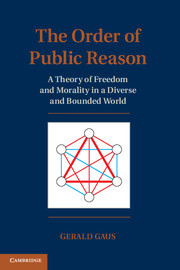Book contents
- Frontmatter
- Contents
- Preface
- I The Fundamental Problem
- PART ONE SOCIAL ORDER AND SOCIAL MORALITY
- PART TWO REAL PUBLIC REASON
- V The Justificatory Problem and the Deliberative Model
- VI The Rights of the Moderns
- VII Moral Equilibrium and Moral Freedom
- VIII The Moral and Political Orders
- Concluding Remarks on Moral Freedom and Moral Theory
- Appendix A The Plurality of Morality
- Appendix B Economic Freedom in States that Best Protect Civil Rights
- Bibliography
- Index
VII - Moral Equilibrium and Moral Freedom
Published online by Cambridge University Press: 03 May 2011
- Frontmatter
- Contents
- Preface
- I The Fundamental Problem
- PART ONE SOCIAL ORDER AND SOCIAL MORALITY
- PART TWO REAL PUBLIC REASON
- V The Justificatory Problem and the Deliberative Model
- VI The Rights of the Moderns
- VII Moral Equilibrium and Moral Freedom
- VIII The Moral and Political Orders
- Concluding Remarks on Moral Freedom and Moral Theory
- Appendix A The Plurality of Morality
- Appendix B Economic Freedom in States that Best Protect Civil Rights
- Bibliography
- Index
Summary
Living as members of society and dependent for the satisfaction of most of our needs on various forms of cooperation with others, we depend for the effective pursuit of our aims clearly on the correspondence of the expectations concerning the actions of others on which our plans are based with what they really will do. This matching of the intentions and expectations that determine the actions of different individuals is the form which order manifests itself in social life. … [The] … authoritarian connotation of the concept of order derives … from the belief that order can only be created by forces outside the systems (or “exogenously”). It does not apply to an equilibrium set up from within (or “endogenously”).
F. A. Hayek, Rules and OrderThe law is the creation of the authoritative decisions of society, that is, its officials, its legislators, and judges. In relation to the making and applying of the law, though, the members of a legal order are merely its subjects. …. By contrast, a society's morality is the joint product of the moralities of its individual members. As far as its content is concerned, individual members are its joint makers, not merely its subjects.
Kurt Baier, The Rational and the Moral OrderThe previous chapter examined two “devices of public reason” – approaches to public justification that help us cope with the diversity of evaluative standards, those individual bases for reasoning about the acceptability of moral rules.
- Type
- Chapter
- Information
- The Order of Public ReasonA Theory of Freedom and Morality in a Diverse and Bounded World, pp. 389 - 447Publisher: Cambridge University PressPrint publication year: 2010

